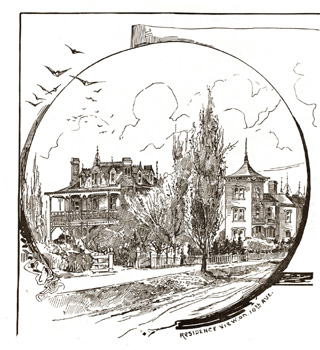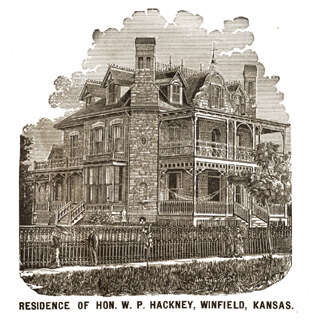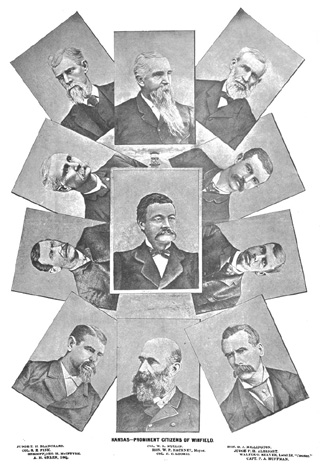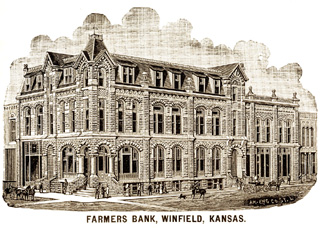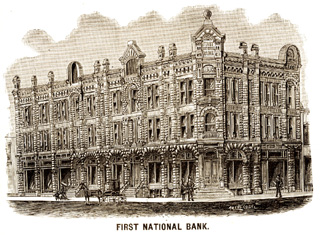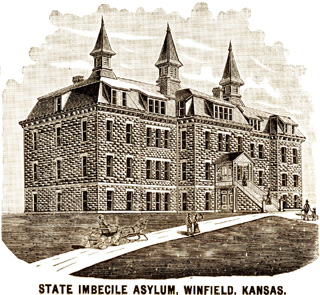Wealthy
Winfield.
Winfield is recognized as the wealthiest city
according to size, in Kansas. As proof of this we herewith submit a correct compilation
of the aggregate capital stock 61 alt the banks in each of the following named
cities, as shown by Underwood’s Bank Reporter for January and February, 1887:
Wichita $753,000
Topeka 750,000
Leavenworth 650,000
Atchison 510,000
Winfield - - - 450,000
Kansas City, Kan., (including
Wyandotte ) 325,000
Newton 316,000
Emporia 291,000
Hutchison 230,000
Fort Scott 225,000
Lawrence 235,000
Wellington 100,000
Thus it will be seen that Winfield is the strong fifth city in the state in banking capital, carrying more than twice as much as any other city of its age and size, and nea4y twice the amount of Lawrence and Fort Scott, among the oldest cities of Kansas.
Winfield has four banks whose solidity and business volume place them first among western monetary institutions. The First National Bank, with a building conceded to be the best bank edifice west of Kansas City; the Farmers Bank, with a building equally fine; the Savings Bank and the Winfield National Bank, exhibit of all the buildings of which appear in this paper.
Winfield is also the fifth city in the state in amount of post office business, in value of buildings and improvements, in the amount of business done, and, if the truth was known, in population. It is the first city of the state in promise of immediate and rapid growth, and as a railroad and trade center.
Mayor W. P. Hackney.
W. P. Hackney, mayor and ex-State senator, and attorney at law, was born in Van Buren Co., Iowa, in 1842, son of Jacob T. and Lucy Chapman Hackney. At the age of eight years, he removed with his parents to Logan Co., Dig. where he was educated. At the age of eighteen, in 1861, he entered the army; enlisted in Company H, Seventh Regiment 1 Illinois Volunteers. Entered as a private, and at the end of three months was promoted to corporal, after nine months to sergeant, and subsequently to orderly sergeant, which position he held for nearly two years. In January1 1865, he received a commission as captain, commission dated from October 5, 1861. He participated in the engagements of Ft. Henry, Ft. Donelson, Shiloh, taking of Corinth, and the battle of Corinth, Nashville, Altoona Pass Wises’ Forks and other engagements of his command; and was wounded at Altoona Pass on the 6th of October, 1864 by a ball through his right cheek, and one through his body; was disabled until the battle of Nashville, and was mustered out in July, 1865. On returning to Illinois he engaged in farming until April, 1867 when he commenced reading law in Lincoln, Ills., with Col. W. D. Wyatt. He was admitted to the bar in the fall of the same year, and commenced the practice of law. In Jan. 1868, he was married to Miss Callie L. Vanderventer, daughter of Andrew and Nancy Venderventer. Has had two children—Lyonel V., deceased and Clyde W. Hackney. He is a republican in politics. He was deputy collector of internal revenue for the Eighth District of Illinois. He came to Kansas in 1870, and located at Arkansas City, this county, removed from there to Belle Plaine, Sumner Co., in 1871 and remained there until 1873, when he removed to Wellington, Sumner Co., and in 1874 came to Win- field. He has devoted his time exclusively to the practice of his profession. In 1872 and 1874 he represented Summer Co. in the State legislature, and represented (Cowley Co. as State senator in 1881—’83. He was elected mayor of Winfield, in April, 1887, and now holds that office. He is a member of G. A. R. Post, No. 85.
J. M.
Stafford & Son,
The firm of J. M. Stafford & Son, a very
prominent and successful one, was by mistake left out of our first edition of
Winfield. It is with pleasure we call attention to them as one of the most
reliable firms in the west.
The City Press.
Nowhere in the west can be found better newspapers, or papers that receive a more liberal patronage. The Courier is the leading paper of the city, being published daily and weekly, the weekly edition having six pages of nine columns to the page. It is in its 16th year.
The Daily Courier is in its fourth year and on March 10, enlarged to a nine column folio. The Courier is edited by Ed P. Greer, while the city department is under the control of Walter&. Beaver, for a number of years connected with the Missouri press, more particularly the St. Joseph dailies. The Courier is straight republican and the official organ of that part of the country.
The Telegram, weekly and daily, is owned by Chas. C. Black and Geo. C. Rembaugh. Mr. Black is secretary of the Denver Memphis & Atlantic railway, and Mr. Rembaugh is postmaster. The editorial and business management of The Telegram is in the hands of D. C. Young, and the city department is in the hands of J. W. Henthorn, both thorough and experienced newspaper men. The Telegram is strongly democratic. The weekly is in its 16th year while the daily is hardly a year old, but is proving a success financially.
The Daily Visitor is a morning six column folio paper, owned and edited by Wm. W. Allison. It is republican in politics.
The Tribune is a weekly newspaper and edited by E. B. Buck.
The American Non-Conformist is
a labor organ recently removed from Iowa and is meeting with success.
The above sketches are necessarily incomplete, it being almost impossible to show up a city as it should be in the circumscribed space of a newspaper article. Winfield offers the best and safest field for investment of any city in southwestern Kansas. The WORLD would advise people contemplating a western trip to visit Winfield by all means.
Are You Going South?
If so, it is of great importance to you to be
fully informed as to the cheapest, most direct and most pleasant route. You
will wish to purchase your ticket via the route that will subject you to no delays
and by which through trains are run. Before you start, you should provide
yourself with a map and time table of the Gulf Route (Kansas City, Fort Scott
& Gull R.
R.,) the only direct route from and via Kansas City to all points in eastern
and southern Kansas southwest Missouri and Texas. Practically
the only route from the west to all southern cities. Entire trains with
Pullman Palace sleeping cars and free reclining chair cars, Kansas City to
Memphis; through sleeping car, Kansas City to New Orleans. No change of cars of
any class1 Kansas City to Chattanooga, Knoxville and Bristol, Penn. This is the
direct route, and many miles the shortest line to Little Rock, Hot Springs,
Eureka Springs, Fort Smith, Van Buren, Fayetteville, and all points in Arkansas.
Bend for a large map. Send for a copy of the “Missouri and Kansas Farmer,” an
eight page illustrated paper1 containing full and reliable information in
relation to the great States of Missouri and Kansas. Issued monthly and mailed
free. Address
J.
E. Lockwood,
G.
P. & T. A., Kansas City.
The
Farmers Bank.
This bank, flow one of the strongest in the city, was organized and commenced business Sept. 1, 1884. The capital stock is $125,000.00. The bank is a partnership concern to run a period of years and the surplus and earnings remain in the bank as an accumulation surplus fund. The bank also makes long time real estate loans for eastern capitalists. The partners are Robert Kerr and John A. Eaton. Mr. Kerr is a large real estate owner and capitalist of Ohio and has the controlling interest in the Farmers Bank at Marion, Ohio, and large interests in the Nevada Deposit Bank of Nevada, Ohio, and First National Bank at Medicine Lodge, Kansas. Mr. Eaton resides at Winfield and has the control and management of this bank. The officers arc Robert Kerr, president, John A. Eaton, vice-president and manager; Thomas J. Eaton, cashier; J. F. Balliet, assistant cashier; J. W. Spindler, teller. The correspondents of this bank are First National Bank, New York; Bank of Commerce Kansas City, and First National Bank, Kansas City.
The First National Bank.
The First National Bank under its present
management is the oldest bank in Cowley county. M. L.
Read and M.
L. Robinson organized Read’s Bank in August, 1872. ‘In 1884 organized
the First National Bank M. L. Read, its president, M. L. Robinson, vice-president;
W. C. Robinson, cashier Geo. W. Robinson, assistant cashier. heads’ Bank for
many years was a household word all over Cowley county and Southern Kansas and
was always regarded as one of the leading private banks in the State, and the
change into a National Bank was made to meet the demands of the times. The
First National Bank is regarded as one of the strongest and best managed banks
in the State. Conservative, careful and yet sufficiently
liberal to meet the wants of the community. It has a paid up capital of
$125,000. a surplus account of $10,000 and an
undivided profit account of $12,000. It has also connected with it, of which M.
L. Robinson is president, and W. C. Robinson is treasurer, a Mortgage company
with a paid up capital of $100,000, which makes a specialty of handling Kansas
mortgages on from three to five years time at a low rate of interest, six and
seven per cent. The First National Bank building is one of the best arranged
and most impressive buildings in the State of Kansas,
built of Cowley county limestone, both white and blue, and is looked upon as a matter of pride by
the people of Winfield as well as by the proprietors. The business of this bank
aggregates more than $600,000, with a deposit account of about $425,000, and
constantly and rapidly increasing.
D. A. Millington.
Daniel A. Millington was born in Hubbardton, Vermont, May 16, 1823, educated in the common and higher schools of that state taught schools for six winter terms. Moved to Morton’s Corners, Erie County, New York, in the fall of 1844, and to Chicago Ill., in the spring of 1845. Settled in Will County, Ill., in 1847 and was married to Mary A. Smith1 May 16, 1848. Went overland to California in the spring of 1850 and worked in the gold placer until the fall of 1851. Returned then and opened a lumber yard at Joliet, Ill. In the spring of 1853 moved to Iowa City, Iowa, an went into the general merchandise business and became connected with the noted firm of W. B. Daniels & Co. In the fall of 1862, moved to Leavenworth, Kansas, and was there a member of the general merchandise firm of Daniels, Millington & Co. which did a business of a million dollars a year. In 1866 moved his wholesale business to St. Louis, Mo., closed out in 1868, did business in Fort Scott in 1868 to 1870, and came to Winfield August 16, 1870 where he has since remained. He at once became a member of the Winfield Town Company, was the engineer who laid off the Winfield town site and one of its three principal owners, has been prominent in all the struggles of the early history of Winfield. Took control of the Winfield Courier on August 16, 1876, and has been its editor ever since. Has four daughters, Clara the oldest is now the wife of Allen B. Lemmon, of the Newton (Kas.) Republican, and the mother of four children. Ada the second is wife of Joe Ex Saint, now holding a very extensive cattle ranch at Grants N. M. she has two children. Kate, the third, is wife of Will J. Wilson a clerk of the state senate, has one boy and lives in Winfield. Jessie, the youngest, is wife of E. H. Nixon, of Noble& Nixon, Medicine Lodge, Kansas.
Col. S. E. Fink is a native of the western reserve of Ohio. He spent his boyhood upon a farm on the line of the Underground railroad. After, five years study he became a teacher in Illinois and from this state entered the army as a private soldier. He was a clerk for Gen. Dodge of Iowa, for nearly a year and by his appointment became identified with U. S. colored troops. lie was a prisoner five months. At the close of the war he graduated from the law school at Cleveland and practiced his profession at Mansfield, Ohio, nearly twenty years. He is a radical republican and stumped in Ohio every year since the war until his removal to this city in 1886. He is devoted to and loves his profession.
Thomas A. Blanchard.
In this paper will be found a portrait of T. A.
Blanchard, one of the
oldest living white settlers of Cowley county, having
settled in the vicinity of Winfield in 1869. From 1863 to the time of his
taking up a home in Cowley county he was elected and
served two terms sheriff of Woodson county; after arrival here he was elected
chairman the first board of county commissioners. In politics he is a
Republican, but fearless, outspoken and independent in his views. In former
days he was an extensive traveler, having crossed the plains twice, the first
trip having been made in ‘49, when the glittering gold caused him to take the
journey to San Francisco. He traveled on the broad ocean to the Sandwich and West India
Islands, and the greater portion of South America, as well as central America and Old Mexico. He has struck pay dirt in
the mines of California, Dakota and Wyoming, where he spent a number of years.
The gentleman will show all of hi relics, and dwell upon the memories of each,
but as lie points to his old cutlery sword his face lights up with an honest
pride as in his memory he fights the old battles over. He was a member of the
famous Seventh Missouri cavalry, enlisting in 1861, for three years. His term
of services having expired, he enlisted in company K, First Missouri cavalry,
Missouri veteran volunteers, being engaged in all the important battles west of
the Mississippi, and receiving many severe wounds during the conflicts. In 1858
he married Miss Sarah E. Allen. Three children are the fruit of the union, all
of which reside in Winfield. In conclusion, Mr. Blanchard was formerly a member
of the old established firm of real estate brokers Converse, Finch &
Blanchard, one the most popular and reliable firms of Winfield, being noted for
their upright and square dealing. At present he holds the office of police
judge of Winfield.
Public Buildings.
All the public buildings are built of the magnesian limestone of which abundant deposits are found in the immediate vicinity. The buildings are of tasty architecture, the stone used being dressed in the rough ashlar style. The public buildings, among which are the State Asylum, for Imbecile Youth the college of the Southwest, Kansas Methodist Conference, the City Hall, three school houses, and the new opera house represent over half million dollars expenditure and far superior to the similar buildings of any city in Kansas.
The
Winfield Water Company.
This company, organized in 1883, has done a very satisfactory business; has met every obligation promptly, and is to-day on a solid paying basis, with much promise for the future. Its patronage has steadily increased, until now it has nearly four hundred consumers. The works were built and are now owned by local capital, as the following lists of stockholders and officers indicate:
Stockholders:—M. L. Read, A. Gertrude Robinson, W. C. Robinson,
A. H. Doane, Geo. W. Robinson, J. L. Horning, W. P.
Hackney, Chas. C. Black, all of Winfield. ,
Officers:—M.L. Read, president. Chas. C. Black,
vice-president; W. C. Robinson, secretary; J. L. Horning, treasurer, A. H. Doane, superintendent; J. Wade McDonald, attorney.
The
Emigration.
Thousands of persons are now rushing from the old worn States of the East into Kansas. Besides the ladened down passenger coaches on the various roads leading into the State, strings of wagons may be seen at all hours of the day wending their way across the prairies ladened with men, women and children who are coming to the State to make their homes in it. Land is the cry among them all, “a home that we may call our own is what we come for” These are words uttered by nine-tenths of all who come into the State, in response to an question asked them concerning their object in coming to Kansas. Good land, good climate, good water and better health and a borne they may call their own, are what now is sought for by the thousands of people who are rushing into the State of Kansas.
